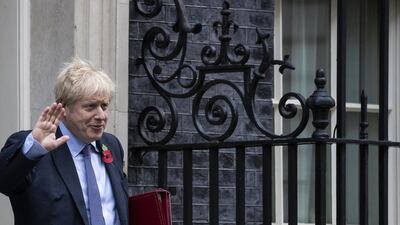Rivals of Boris Johnson on Wednesday pinned their hopes on projections that millions of voters would switch their loyalty to parties opposed to leaving the EU, as the country prepares for its first winter election since the 1920s.
After the overnight announcement that a general election had been set for December 12, Britain braced for a contest expected to depart sharply from business as usual.
Campaigning is due to end days before the winter solstice and comes in the run-up to Christmas, when airwaves are dominated by an advertising war and venues for events are hard to book.
The backdrop is a sharp division in the electorate between Leave and Remain voters over the issue of Brexit.
Market researcher Ipsos Mori said Brexit had displaced the health service and immigration as top issues for many voters.
Mr Johnson had an opportunity to try out his campaign punchlines during a clash with opposition leader Jeremy Corbyn in the House of Commons on Wednesday.
The prime minister said he had been blocked from delivering Brexit and wanted a majority government to meet the latest deadline Jan 31.
“Leadership means standing up for the people of this country, for our police, for our NHS, and for our economy,” Mr Johnson said.
“And above all it means getting Brexit done. The time for protest is over. It’s time for leadership.”
Labour countered that it could also achieve Brexit by giving voters a second referendum with a choice between “a sensible Leave deal or Remain”.
“A Labour government will be on your side, while Boris Johnson’s Conservatives, who think they’re born to rule, will only look after the privileged few,” Mr Corbyn wrote in a newspaper editorial on Wednesday.
At the launch of a tactical voting campaign, the anti-Brexit pressure group Best for Britain unveiled the results of a poll of 46,000 voters to bolster its argument that Remain voters could deprive Mr Johnson of a majority.
Its figures show he is on course to win 364 seats, a majority of 40. It argues that if two in five anti-Brexit voters switch parties, it would cost the Conservatives 87 seats and help to ensure an alternative government.
Dominic Grieve, a former Cabinet minister, said he would run against his old party to hold his seat. He said tribal loyalties had broken down under the pressure of Brexit.
Accusing Mr Johnson of “mendacity”, he said the Conservative leader had purged the party of its moderates.
As he spoke, the party leadership refused to restore Amber Rudd, a former home secretary. It said Ms Rudd failed to give sufficient assurances of her future loyalty.
At least 57 MPs are stepping down from the 650-strong body before the campaign.
With the political runes so hard to read, analysts have sought to define the swing voters that could propel Mr Johnson back to Parliament.
Onward, a right-leaning think tank, said the party should appeal to blue-collar workers who prize economic and social security above all else.
“This requires a pivot for the Conservative Party," its report said. "We argue for the government to articulate a new political philosophy which we call Conservatism for the Common Good."
That would entail greater investment in public services, a focus on higher-paid jobs, boosts for regional towns, especially in northern England, and new housing policies.
Labour sees this as threat to its reputation as the party of working-class voters.
It is pitching a radical socialist government pouring more money into the NHS, nationalisation of utilities and much higher taxes on the biggest earners.
The two main political parties face a fierce challenge from the Liberal Democrats and the newly formed Brexit Party.
The Liberal Democrats have pledged to cancel Brexit, which could win over Labour voters outraged at the party’s ambiguous stance on EU membership and Conservative supporters who backed Remain in the 2016 referendum.
The Brexit Party, led by Nigel Farage, is wooing working-class Labour voters who want out of Europe.
Mr Grieve predicted that voters on all sides would hate Mr Johnson’s deal when they saw it debated.
“This is a terrifyingly bad deal for our country’s future,” he said.
The National Institute of Economic and Social Research think tank released estimates that said under Mr Johnson’s deal, the economy would be 3.5 per cent smaller than if the UK stayed in the EU.
That would leave a £70 billion (Dh330.88bn) economic black hole by 2030.
The study said a no-deal Brexit would be even more damaging, making the British economy 5.6 per cent smaller at the end of the decade.


